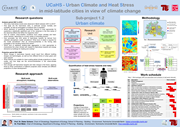Research Module 1.2 Urban Climate
General
This sub-project contributes to the Research Unit by a quantitative analysis of the atmospheric processes causing heat stress. We provide atmospheric data from observations and model simulations for the other sub-projects. We use observational data on indicators of heat-stress risks to quantify outdoor heat-stress hazards. Our results will be utilised for analyses on actor constellations and spatial patterns of urban development. The sub-project will also contribute to collaborative research on effectiveness and efficiency of actions for reducing heat-stress risks.
Selected research questions
Our major research questions are grouped into two different study periods, i.e., the analysis period spanning over the decade from 2001 to 2010 (and beyond), and the projection period from 2041 to 2050.
Analysis period
- How often have heat-stress events been observed in Berlin during the decade from 2001 to 2010?
- How large are the heat-stress risks, particular concerning excess mortality and morbidity, as well as prolongation of medical care in hospitals?
- How do outdoor urban-weather conditions force indoor climates and heat-stress hazards, depending on a broad variety of controlling factors?
Projection period
- Which change in heat-stress hazards would result from different building designs and technologies, as well as from different forms of urban green and open spaces?
- What are suitable methods for downscaling global climate projections to urban scales, and how large are the error/uncertainties in the urban-climate projections?
- How strongly would heat-stress hazards and risks change in the future, applying three by three combinations of different projected urban climates and different projections of urban development?
Collaboration within Research Links (RL)
| 410a | Atmospheric processes, urban/building green and pavements |
| 420a | Urban climate and building energy demands |
| 490 | Urban climate projections |
Collaboration within Research Cluster (RC)
